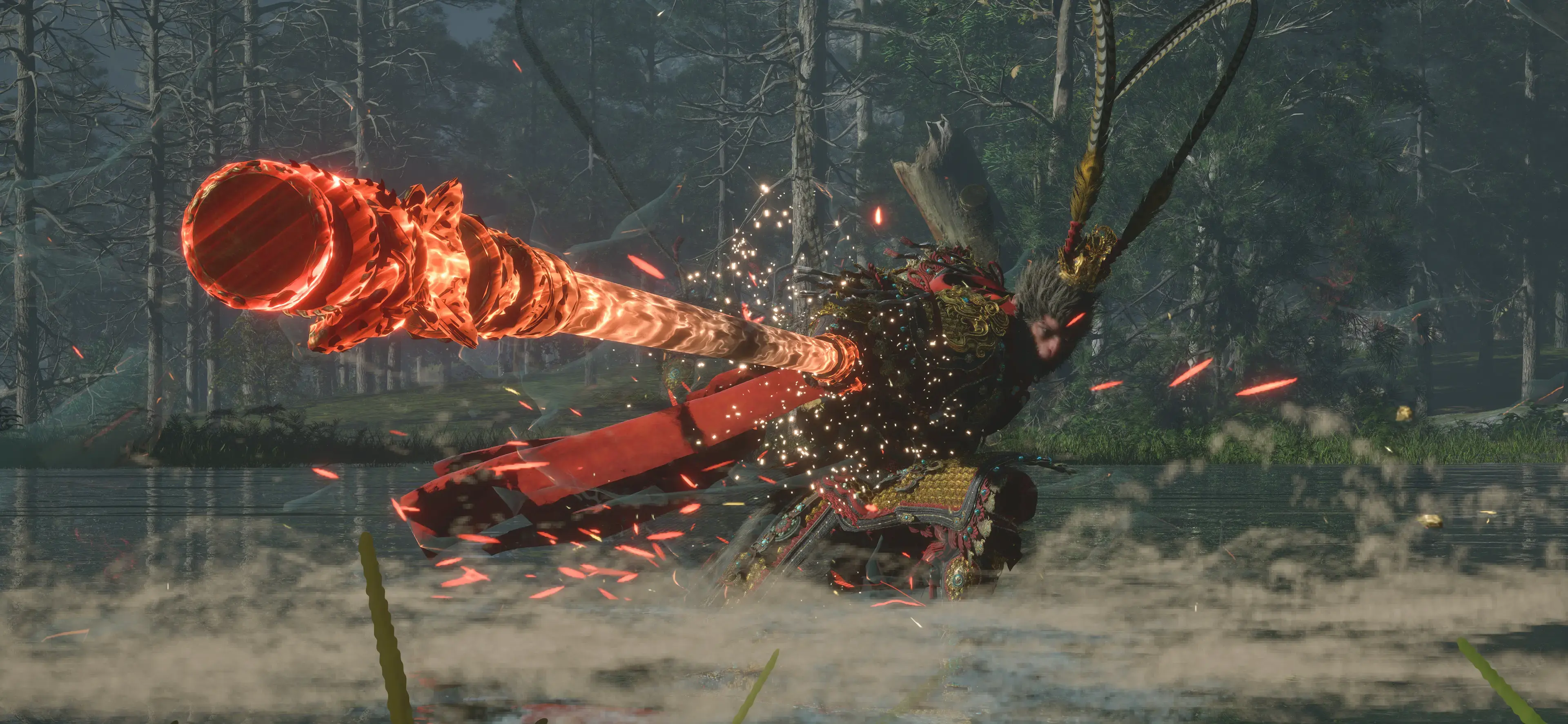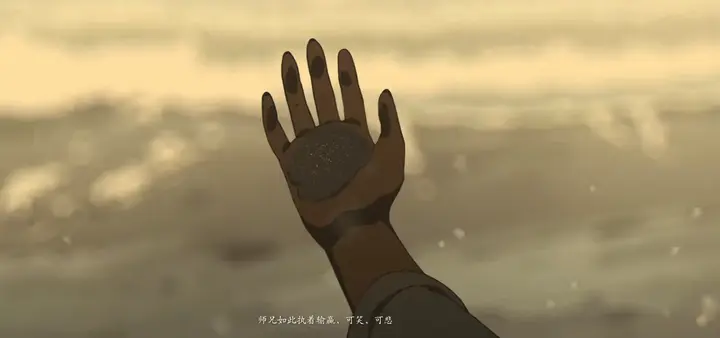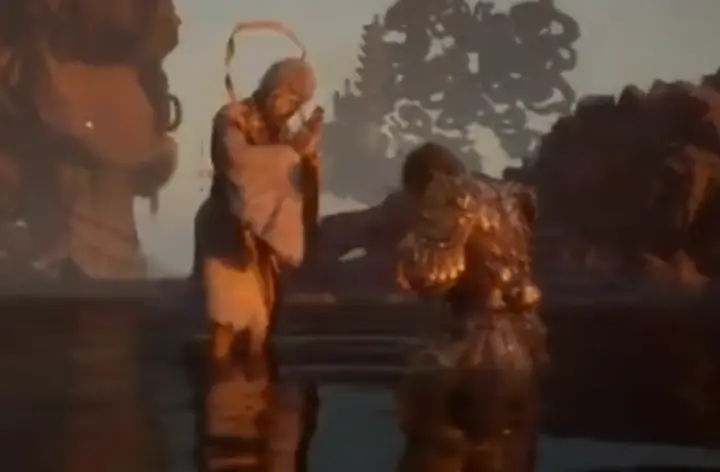Who is the Old Monkey in Black Myth Wukong
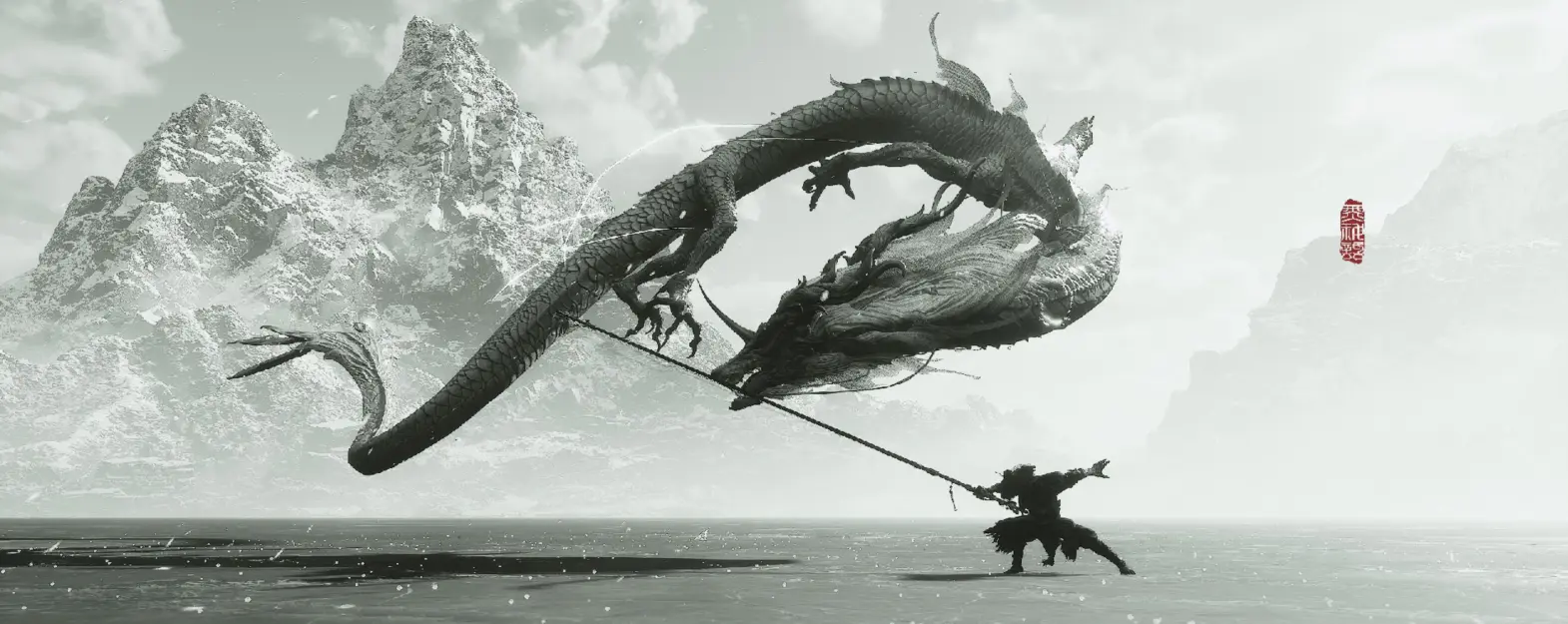
Based on the shadow images, “Black Myth: Wukong” has already hinted that the old monkey is Jin Chanzi (Tang Sanzang, reincarnation, Buddha, etc.).
Currently, the only reason online for opposing Jin Chanzi is that the old monkey’s words are lies, which do not align with Jin Chanzi’s identity. In fact, although Jin Chanzi does not appear, his character is consistently portrayed throughout the game.
First, this is “Black Myth: Wukong.” Black Myth implies a subversion of character settings. Game Science does respect the original work, but only in terms of story events, interpersonal relationships, and magical artifact settings. The character settings in the game have been altered. Huangfeng Great King has a righteous side, and Lingji Bodhisattva has a selfish side. Why should we assume that Jin Chanzi cannot say the words at the end? Next, I will present evidence from the shadow images.
The following shadow images are from Black Myth Wiki. Thank you to the contributors for their selfless dedication! Long live the spirit of open sharing on the internet!
Why It Must Be Jin Chanzi or a Related Identity
Evidence 1: The Pursuit of Truth
The poem on the old monkey’s shadow image mentions:
The path to immortality is walked by countless people. Seeking the Dao without seeking truth, saving others but unable to save oneself.

Next, look at Huang Mei’s shadow image—Huang Mei debates with Jin Chanzi.
Huang Mei asks, “Junior brother, what is the meaning of life?” The young monk replies, “Seeking truth.” Huang Mei counters, “What is truth?” The young monk answers, “The way all things operate, the law of the universe’s origin.”
Huang Mei seeks victory, while Jin Chanzi seeks truth.
Evidence 2: Attitude Towards the Chosen One
In the second CG animation, Huang Mei is obsessed with winning, while Jin Chanzi believes that winning or losing should not matter, aligning with the pursuit of truth.
The celestial beings of Heaven say he is gambling. The Buddha of Ling Mountain says that gambling inevitably leads to loss. He says he is not gambling, nor has he lost.
Similarly, the old monkey does not care about winning or losing. What matters more is—seeking truth. The old monkey believes he is not a gambler but a waiter, waiting for the Chosen One who can inherit Sun Wukong’s legacy. Who is the old monkey gambling against? Ling Mountain, and coincidentally, Jin Chanzi also comes from Ling Mountain.
Evidence 3: Buddhist Decorations and Gestures
- Wearing Buddhist prayer beads
- A ribbon behind him, similar to Lingji Bodhisattva
- The ending gesture is a Buddhist prayer gesture

Ending Animation, the old monkey and the Chosen One perform a Buddhist prayer gesture
Why It’s Not a Bodhisattva or Patriarch Bodhi
The old monkey’s shadow image has already helped us eliminate these possibilities.
Some say he is Guanyin Bodhisattva. Some say he is Patriarch Bodhi. Others say he is Sun Wukong himself.
Why It’s Not Patriarch Bodhi
The immobilization technique used by the Black Wind Mountain land god was taught by an immortal, who instructed him to pass it on to the Chosen One.
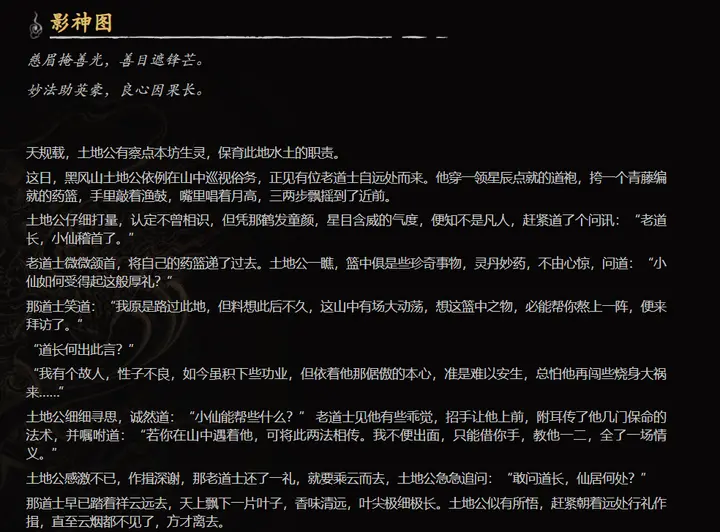
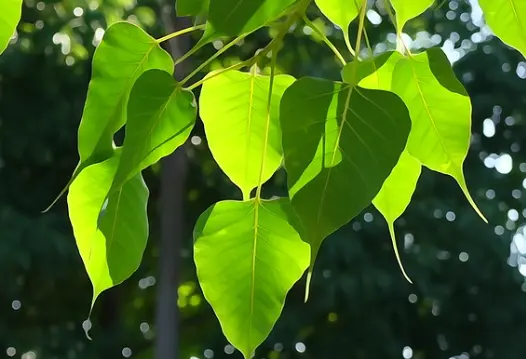
Why It’s Not Guanyin
When the Chosen One sets off, he will personally make a willow stick for them. Breaking a willow branch to bid farewell, he feels a sense of reluctance.
Many people speculate that the old monkey is Guanyin based on the willow stick. The primary function here is clearly the poetic symbolism of breaking a willow branch to bid farewell. Additionally, this is a willow stick, not a willow branch, and there is no hint of the jade vase.
What relates to Guanyin is the item used for brewing (unlocked in the second playthrough)—the jade vase and willow leaf. This is a reference to the jade vase and willow leaf.
A single willow stick certainly cannot represent Guanyin.
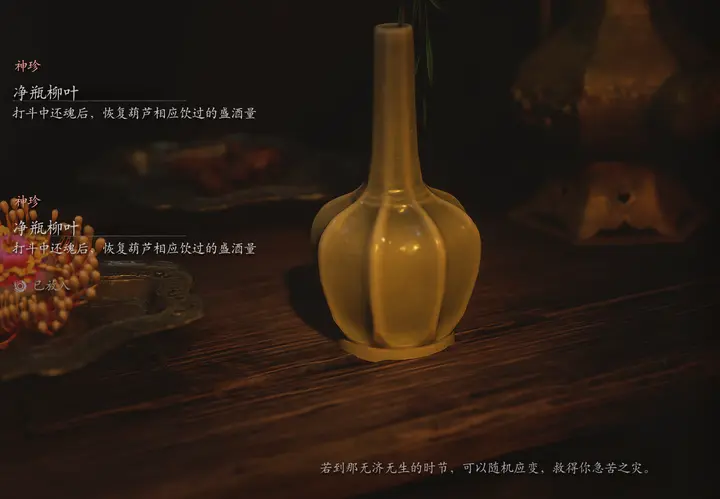
If the old monkey were Guanyin, staying in the Flower-Fruit Mountain all along, who would the Black Bear Spirit go back to apologize to???
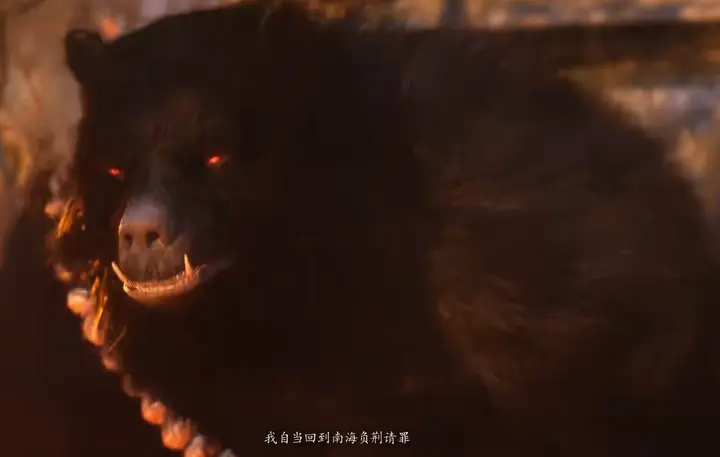
Why It’s Not Yuan Hong
First, let’s take a step back and assume that Game Science really defaults to Meishan being the Seven Sages, and even follows the “Investiture of the Gods” setting!
- The old monkey is Buddhist, while Yuan Hong is Taoist, which directly contradicts.
- Throughout the journey, the Meishan brothers, as a subplot, each mention their elder brother in their dialogue. Why doesn’t the old monkey mention him?
- The old monkey’s encyclopedia entry is only unlocked in the second playthrough. As a character from “Investiture of the Gods,” is Yuan Hong worthy of such a grand reveal?
- White-robed scholar, Yellow-robed official, Green-hatted martial artist, Black-handed Taoist, White-axed warrior. Each name has a color, and white is already taken by the white-robed scholar. If it were the White Ape, it wouldn’t fit the naming pattern. (White and white are both white, but they are deliberately distinguished here. The White Ape’s original name is white, so including it would violate the naming rules.)
Is the Old Monkey Lying?
Many people say the old monkey is lying, but is he really lying?
Look at what the old monkey comments on at the end—the six roots.
- Chapter 1—Eye: Seeing what one likes and wanting to possess it. Elder Jinchi covets the kasaya, desiring material wealth.
- Chapter 2—Ear: Listening to one-sided words, where good intentions may lead to evil deeds. Lingji, as a Buddha, and Huangfeng, as a demon, each only see their own perspectives, leading to the destruction of Huangfeng Ridge. The scholar, due to a dream, kills an innocent white fox. The side quest involves killing the kind-hearted Shi Zi family.
- Chapter 3—Nose: Obsessed with emotions, unable to extricate oneself. Kang Jinlong becomes infatuated and falls into depravity, while Huang Mei becomes obsessed with winning and strays from the path.
- Chapter 4—Tongue: Treating others as mere tools, harming others for personal gain. The world is a furnace, and the fourth sister becomes a pill. The demons of the mortal world are merely materials for the gods.
- Chapter 5—Body: Fear of disasters, fearing everything, and thus losing everything. The Bull Demon King faces a midlife crisis, losing his wife and children. The Bull Demon King fears everything, and thus loses everything.
The old monkey is commenting on the themes and messages of the first five chapters! The conflict between Buddhism and Taoism turns the world into a furnace. The gods are obsessed with spiritual essence, causing all living beings to struggle in the world. Are these thematic lines really lies? Or are they meant to provoke thought? Are Sun Wukong’s desires seen as wrong by Buddhism and Taoism, but are they truly wrong? Was Sun Wukong born mischievous, or is the world inherently unjust?
Thus—Chapter 6—in a place unknown to the old monkey, the Great Sage’s will is born—the will to desire.

Please look again at Jin Chanzi’s attitude—non-interventionist pursuit of truth. If he believes the world is unjust, how can he prove it? If he intervenes, wouldn’t he be like Huang Mei, reversing cause and effect? He appears to criticize Sun Wukong, but in reality, he is anticipating Sun Wukong’s own will.
The true will to desire does not require external intervention. Like in “Elden Ring,” only by experiencing the suffering and desires of all beings can one forge their own law.
In fact, the old monkey is the one who believes in Sun Wukong the most. That’s why he believes he is not gambling, because he trusts that Sun Wukong’s will to desire will be inherited.
This process should not and cannot be interfered with. The traces of the journey to the West cannot be erased.
Thus, although the old monkey does not know about the will to desire, he knows that Sun Wukong’s essence will be passed down.
Experiencing everything, feeling everything, reflecting on everything—this is the Great Sage’s will to desire.
What are the Buddhist will clones, the Golden Headband clones? They are all externally imposed and must be rejected!
Will? Enlightenment!
The true will is derived from reflecting on what one sees and does.
This is why I get angry at some analyses. Many answers try to prove their own version of the Great Sage, their own version of Jin Chanzi, over-interpreting the ending dialogue. The official shadow images make it clear, but people refuse to connect or believe them.
It seems that interpretations always aim to be grander, more unique.
Well, let me say this: all the theories about Buddhist will, Yuan Hong, Guanyin, Taibai Jinxing, Six-Eared Macaque, and Sun Wukong are nonsense! The Jin Chanzi theory is lofty enough.
Unity of knowledge and action, unbound by Buddhism, unbound by Taoism, transcending the three realms, existing beyond the five elements.
—Only such a will is worthy of the Great Sage and the journey to the West.
